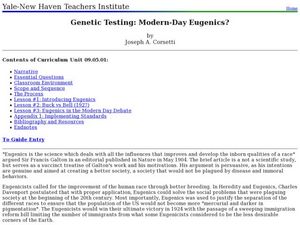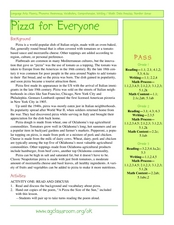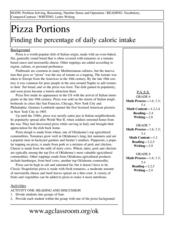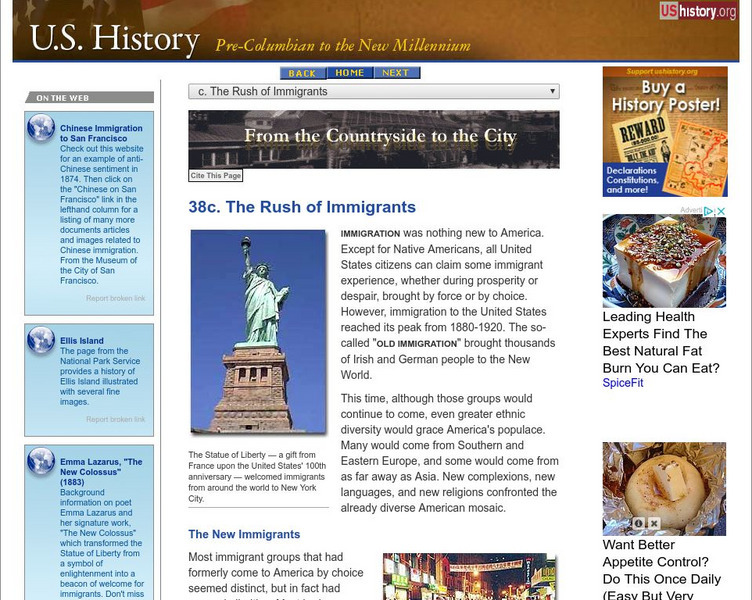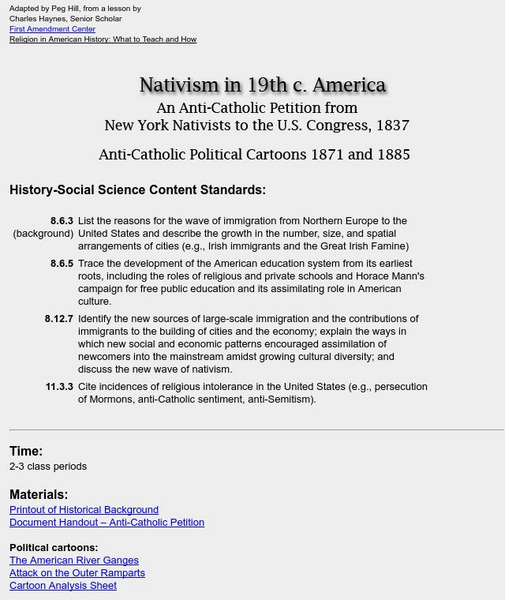Curated OER
American Growth and Expansion in the late 1800s
Eleventh graders examine a picture of John Gast's, American Progress to determine what they know about American growth between 1877- 1900. By working through thirteen center or folder activities, they study the economics,...
Curated OER
Key Ingredients: America by Food
Students participate in a series of activities to explore the types of food Americans eat, how food choices differ in various parts of the country, and how the availability of various foods has changed over time.
Curated OER
Key Ingredients: America By Food
In this set of five lessons, students analyze the important of food traditions, identity, and history. Students analyze how food traditions contribute to family identity, investigate family food traditions through interviews, and compare...
Curated OER
Call to Arms: A Service Project
Sick of selling candy and washing cars? How about hosting a Digital Day or a Learning Lunch? The suggestions here make fund raising fun and rewarding. Raise money to preserve important maps and other primary source documents.
Curated OER
Genetic Testing: Modern-Day Eugenics?
Students trace the history of the development of Eugenics. In this social studies lesson, students read and analyze a real life case. They write a paper about what they read.
Curated OER
Pizza for Everyone
Pizza is the inspiration for the cross-curricular instructional activity detailed here. Start out with a poem about pizza and move into a discussion about balanced eating. To close the language arts portion of the instructional activity,...
Curated OER
Oklahoma Stone Soup
Class members complete activities related to the story "Oklahoma Stone Soup." First, pupils read, discuss, and answer questions about the story. Next, to incorporate math into the lesson, learners make stone soup using a variety of...
Curated OER
Pizza Portions
Students explore mathematics by participating in a pizza pie activity. In this nutrition instructional activity, students identify the caloric intake in a piece of pizza and estimate the average number of slices eaten by a person....
Curated OER
Geography of the Study of the Spanish-speaking People of Texas
Students identify the physical features, demographic characteristics, and history of the four Texas towns featured in Russell Lee's photo essay, "The Spanish-Speaking People of Texas." They conduct Internet research, and create a travel...
Curated OER
History of American Child Labor
Students study the historical and social issue of child labor. They examine the photographs of Lewis Hine to see evidence of child labor and decide how the photographs depict the historical impact of the practice. They write a letter to...
Immigration and Ethnic History Society
Iehs: Kevin Kenny, "Insiders & Outsiders in 19th Century American Immigration"
This article focuses on the history of who were the insiders (with rights) and the outsiders (without rights) in the early history of the US (prior to the 14th Ammendment. It was largely based on race not citizenship.
OpenStax
Open Stax: The Impact of Expansion on Chinese Immigrants and Hispanic Citizens
As white populations moved westward in the 19th century, Chinese immigrants and Hispanic Americans faced racism and discrimination and were unable to compete on an equal basis for land. Eventually, both groups settled into urban areas...
Oswego City School District
Regents Prep: Us History: Immigration & Migration: Era of 'Old' Immigration
The earliest waves of settlers to the Americas, up through the first half of the 19th century, constitute the era of 'old' immigration. There are some distinctions between those settlers who came prior to the Revolutionary War and those...
PBS
Wnet: Thirteen: Freedom: A History of Us: Whose Land Is This? Webisode 8
From Joy Hakim's marvelous set of books, A History of US, this webisode offers narrative, pictures, and teaching guides for the settling of the West after the Civil War.
OpenStax
Open Stax: Urbanization 1870 1900: Great Migration and New European Immigration
What caused the influx of African Americans and European immigrants into urban centers in the late 19th century? Learn about some of the discriminatory and anti-immigrant laws that were enacted to restrict their rights. Includes a chart...
Independence Hall Association
U.s. History: Irish and German Immigration
Read about the reasons thousands of Irish and Germans emigrated to the United States in the first half of the 19th century. Find out why there was a backlash to influx of so many immigrants, and learn about the Nativists who wanted to...
Independence Hall Association
U.s. History: The Rush of Immigrants
Read about the new wave of immigrants who came to America in the late 19th century. See differences between these groups of immigrants and those who came earlier. Find out where immigrants settled, and read about those who did not...
Schools of California Online Resources for Education
Score: Nativism in 19th C. America
In this lesson, students explore the reasons people immigrated to America in the nineteenth century, the urban growth that resulted, the development of public education, the contributions of immigrants, the wave of nativism, and the...
Independence Hall Association
U.s. History: From the Countryside to the City
The growth of cities was rapid in the last half of the 19th century. Read about the good things and bad things that were a result of this urbanization.






